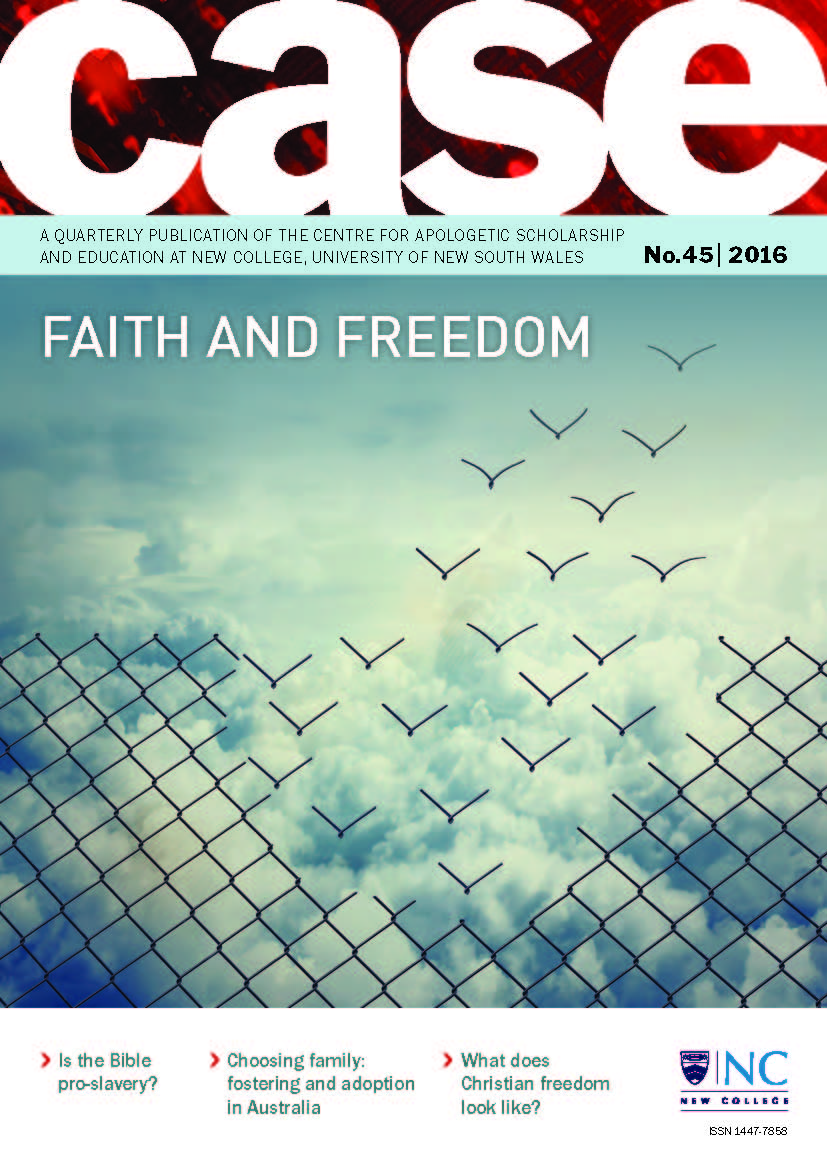Faith and Freedom: Introduction

Trevor Cairney
Freedom seems to be a word on everybody’s lips. And the idea of freedom is typically freedom from something. This is expressed in many forms. Freedom from colonial or dictatorial rule, freedom from trade restrictions, freedom from oppression, freedom from restrictions in sexuality and so on. Don Carson suggests in his book Christ and Culture Revisited (1) that freedom is one of the big four cultural forces in Western societies. We want freedom to make choices about how we live, who we marry, who can lead us, when we die, what career we follow, how we dress—the list goes on.
But it seems that what people generally want freedom from—and for—isn’t the same as what the Bible identifies as our need for freedom. The Bible’s idea of freedom is freedom of conscience. No-one is truly free until Jesus Christ has rid him or her of the burden of guilt (Rom 6:20-23).
Whatever kind of freedom we are thinking of, it tends to go hand in hand with choice. In this issue of Case we explore a number of dimensions to freedom and what the Bible teaches us about it. Faith and freedom intersect at many points in the Bible, and one such point is the Bible’s teaching on slavery.
And yet, how this is seen by many is not what the Bible actually teaches. There
is a pervasive view that the Bible is pro-slavery, and a good understanding of what it does and doesn’t say is an important weapon in any Christian apologist’s arsenal. In our lead article, Andrew Schmidt weighs up whether Christian anti-slavery campaigners, from William Wilberforce to those who oppose human-trafficking today, were acting from, or in spite of, biblical teaching.
Tim Bradford considers the topic more broadly and starts by considering the popular view mentioned above that Christianity restricts our freedom rather
than delivering it to us. As he paints a big picture of what it means to have
freedom in Christ, it becomes clear that this caricature is mistaken. The Bible teaches that Christians are freed from enslavement to sin and death for a
purpose. But what is that purpose, and how does this impact the choices we
make as Christians?
Several of the articles in this issue also explore choices Christians face today. Foster parent Leigh George describes the Australian situation in regard to fostering and adoption, noting the ‘urgent and growing need for foster families’ (p11). With over 43,000 children currently in care, and this number growing every year, she encourages Christians who share their heavenly Father’s heart for adoption to consider choosing to include some of these children in their families.
Dani Scarratt explores the choices Christians make to use our freedom to speak in the Australian context, especially in the light of sensitive public discussions about Islam and sexuality. She asks, can we love our Muslim and LGTBI neighbours while continuing to preach and teach Christian doctrine?
Canadian theologian John Stackhouse also weighs in with advice on making choices about what to do with your life—a decision which he recommends giving more than five minutes’ consideration!
In our books and ideas section you will find reviews of two recent books—
Hugh Mackay’s Beyond Belief and Lucy Clark’s Beautiful Failures.
I hope that you enjoy the articles that we’ve compiled for you. In our next issue we will be introducing a new format. This will devote fewer articles to a common theme and introduce a number of regular sections contributed by a wonderful group of writers. We hope that you will find this helpful.
We also have plans for the launch of a new CASE website at the New College
Lectures in September, that will offer new options for accessing Case content.
Keep an eye out. ©
E N D N O T E
(1) Don Carson, Christ and Culture Revisited.
(Eerdmans, 2008).
Leave a comment
Comments will be approved before showing up.



